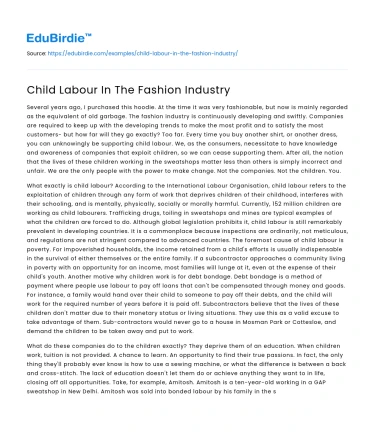Several years ago, I purchased this hoodie. At the time it was very fashionable, but now is mainly regarded as the equivalent of old garbage. The fashion industry is continuously developing and swiftly. Companies are required to keep up with the developing trends to make the most profit and to satisfy the most customers- but how far will they go exactly? Too far. Every time you buy another shirt, or another dress, you can unknowingly be supporting child labour. We, as the consumers, necessitate to have knowledge and awareness of companies that exploit children, so we can cease supporting them. After all, the notion that the lives of these children working in the sweatshops matter less than others is simply incorrect and unfair. We are the only people with the power to make change. Not the companies. Not the children. You.
What exactly is child labour? According to the International Labour Organisation, child labour refers to the exploitation of children through any form of work that deprives children of their childhood, interferes with their schooling, and is mentally, physically, socially or morally harmful. Currently, 152 million children are working as child labourers. Trafficking drugs, toiling in sweatshops and mines are typical examples of what the children are forced to do. Although global legislation prohibits it, child labour is still remarkably prevalent in developing countries. It is a commonplace because inspections are ordinarily, not meticulous, and regulations are not stringent compared to advanced countries. The foremost cause of child labour is poverty. For impoverished households, the income retained from a child's efforts is usually indispensable in the survival of either themselves or the entire family. If a subcontractor approaches a community living in poverty with an opportunity for an income, most families will lunge at it, even at the expense of their child's youth. Another motive why children work is for debt bondage. Debt bondage is a method of payment where people use labour to pay off loans that can't be compensated through money and goods. For instance, a family would hand over their child to someone to pay off their debts, and the child will work for the required number of years before it is paid off. Subcontractors believe that the lives of these children don't matter due to their monetary status or living situations. They use this as a valid excuse to take advantage of them. Sub-contractors would never go to a house in Mosman Park or Cottesloe, and demand the children to be taken away and put to work.
Save your time!
We can take care of your essay
- Proper editing and formatting
- Free revision, title page, and bibliography
- Flexible prices and money-back guarantee
What do these companies do to the children exactly? They deprive them of an education. When children work, tuition is not provided. A chance to learn. An opportunity to find their true passions. In fact, the only thing they'll probably ever know is how to use a sewing machine, or what the difference is between a back and cross-stitch. The lack of education doesn't let them do or achieve anything they want to in life, closing off all opportunities. Take, for example, Amitosh. Amitosh is a ten-year-old working in a GAP sweatshop in New Delhi. Amitosh was sold into bonded labour by his family in the summer of 2007. Chances are he's still working in that sweatshop. Amitosh spends 16 hours a day hand-sewing garments. He only has four possessions: a tattered comic, a penknife, a plastic comb and a torn blanket with an elephant motif. My question is, do you believe that Amitosh's life matters less, and that he shouldn't get an education, and that he deserves to be in that situation?
Child labour is an immense problem that affects hundreds of millions of children around the globe. Is there a resolution? Is there an answer to this issue that has gone on for decades, even centuries? Yes. Some companies don't exploit children. However, I understand that it can be strenuous to find the difference between companies that cover up well, or companies that mean well, so a simple option is to buy locally. Now, I don't mean heading down to Fremantle and buying a bright yellow shirt that says 'I Love Australia' with koalas printed on the back, but buying from Australian-based companies that give you exceptional quality without exploiting children. Buying locally also helps boost the local economy! An example is Bec + Bridge, Bonds, Lorna Jane, General Pants, and I.AM.GIA. Believe me; I know that making sure every single piece of clothing you own is free of child labour, eco-friendly, fair trade and cute is hard! Nevertheless, being aware of the production process for different companies and making at least one right choice might make all the difference for kids like Amitosh.
Child labour is a problem that has been talked about lots over the last decades, but no one ever chooses to really 'hear it'. Consumers need to have more recognition and understanding about companies who exploit children, so we can quit promoting them. We are the only ones with the power to do so. These companies deny kids of an education, prohibiting them from chasing their dreams, or uncovering their passions. A great way to dodge companies that use child labour is to buy locally. Buying locally gives you the warranty that the product you are getting is made with high standards, supports the local economy, and are manufactured under fair working conditions. Something that most people forget is that these children have lives, ambitions, families, hopes, and dreams. The root of everything wicked in the world is the notion that the lives of these children matter less.






 Stuck on your essay?
Stuck on your essay?

